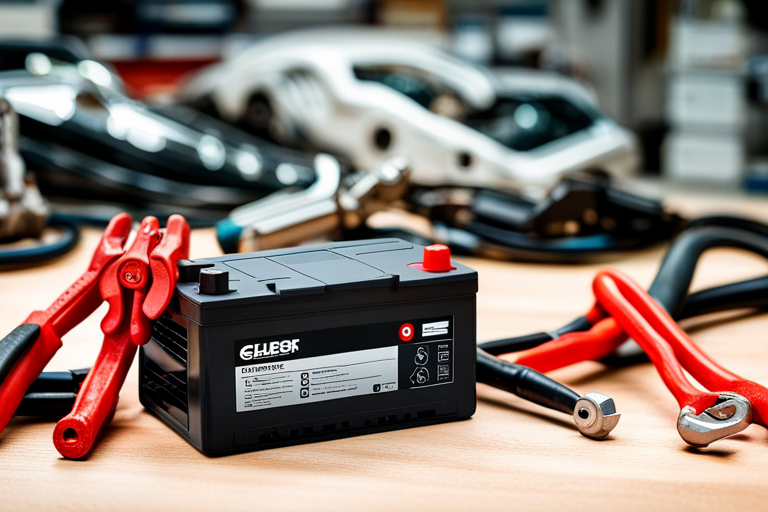How to Choose the Right Car Battery: A Comprehensive Guide

Are you tired of replacing your car battery every few years? Do you find yourself stranded on the side of the road with a dead battery more often than you'd like? We all want our cars to run smoothly and efficiently, but sometimes we neglect the very thing that powers our vehicles: the battery. That's why we've compiled a list of 10 tips for extending the lifespan of your car battery, so you can avoid those frustrating and expensive breakdowns.
In this blog, we'll discuss everything you need to know about your car battery. From understanding the inner workings of a battery to recognizing warning signs of a dying battery, we'll cover it all. Our tips range from basic maintenance tasks to advanced techniques, ensuring that you'll find useful information no matter your level of car expertise.
By following our advice, you can save yourself the headache of dealing with a dead battery and prolong the life of your car's power source. So buckle up and get ready to learn how to keep your car battery running smoothly for years to come.
Table Of Content.
- Understanding Car Battery Basics
- Factors to Consider When Choosing a Car Battery
- Types of Car Batteries
- Battery Size and Fitment
- Battery Performance and Lifespan
- Maintenance and Care for Car Batteries
- Troubleshooting Battery Issues
- Battery Recycling and Disposal
1- Understanding Car Battery Basics

:
A car battery is one of the most important components of a vehicle. It provides the necessary power to start the engine and keep the electrical system running. Before choosing the right car battery, it’s important to understand the basics of how a car battery works. Here are some key factors to consider:
Battery Size: Car batteries come in different sizes, so it’s important to choose the size that matches the specifications of your car. You can check your car’s manual or ask a professional to determine the appropriate size for your vehicle.
Battery Type: There are different types of car batteries available in the market, including lead-acid batteries, AGM batteries, and lithium-ion batteries. Each type has its own advantages and disadvantages, so it’s important to research and choose the type that best suits your needs.
Battery Capacity: The capacity of a battery determines how much power it can store and deliver. Car batteries typically range from 40 Ah to 100 Ah. Choosing the right capacity depends on your vehicle’s power requirements and driving habits.
Cold Cranking Amps (CCA): CCA is a measure of the battery’s ability to start the engine in cold temperatures. It’s important to choose a battery with the appropriate CCA rating for your vehicle, especially if you live in a cold climate.
Reserve Capacity (RC): RC is a measure of how long the battery can provide power to the vehicle in case the alternator fails. It’s important to choose a battery with a high enough RC rating to prevent any unexpected breakdowns.
Brand and Quality: Choosing a reputable brand and high-quality battery can significantly improve the lifespan and performance of your car battery.
💡 key Takeaway: Understanding the basics of car batteries is crucial to choosing the right battery for your car. Factors like size, type, capacity, CCA, RC, brand, and quality should be considered before making a purchase.
2- Factors to Consider When Choosing a Car Battery

When it comes to choosing a car battery, it is important to consider several factors that will affect its performance and longevity. In this section, we will discuss some of the most crucial factors to help you choose the right car battery for your vehicle.
1. Battery Size
The size of your car battery is an important factor. It is essential to choose the battery that fits perfectly into your car's battery tray. Otherwise, it may cause electrical issues and even damage your car's overall performance. Make sure you consult your vehicle's manual to determine the appropriate size that fits your car's specifications.
2. Battery Type
The type of battery that is best for your car will depend on several factors including price, performance, and availability. Traditionally, lead-acid batteries are the most commonly used type of car batteries. However, new technologies such as lithium-ion and nickel-metal hydride batteries are becoming popular for their higher performance and longer lifespan.
3. Cold Cranking Amps (CCA)
CCA is the amount of current a car battery can deliver at zero degrees Fahrenheit. It is an important measurement of the battery's ability to start your car even in cold weather conditions. It is recommended to choose a battery with a higher CCA rating than what is recommended by your vehicle's manufacturer.
4. Reserve Capacity
Reserve capacity is the amount of time a car battery can power your car's electrical system in case of a charging system failure. It is essential to choose a battery with a higher reserve capacity than what is recommended by your manufacturer to ensure your vehicle's functionality in unexpected situations.
5. Brand and Reputation
Choosing a reputable, branded battery can make a significant difference in its performance and longevity. Opting for lesser-known brands or cheap-quality batteries may seem like a cost-effective solution in the short-term but may cause more significant problems down the road.
(Keys takeaway): Factors like battery size, type, cold cranking amps, reserve capacity, brand, and reputation are critical to consider when choosing the right car battery for your vehicle.
3- Types of Car Batteries

When it comes to choosing the right car battery for your vehicle, it's important to understand the different types of batteries available (Keyword 1: types of car batteries). In this section, we will discuss the three most common types of car batteries and their unique features.
1. Lead Acid Batteries (Keyword 2: Lead Acid Batteries)
Lead acid batteries are the most traditional and commonly used type of car battery. They are relatively inexpensive and have a long lifespan compared to other types of batteries. These batteries are also recyclable, making them an eco-friendly option. However, lead acid batteries require regular maintenance and may not perform well in extreme temperatures.
2. Absorbent Glass Mat (AGM) Batteries (Keyword 3: AGM Batteries)
AGM batteries are newer to the market and are quickly becoming a popular choice among car owners. These batteries are sealed, maintenance-free, and offer excellent performance in extreme temperatures. Because they are leak-proof, they are safer to use than traditional lead acid batteries. However, AGM batteries are more costly than other types of batteries.
3. Lithium-ion Batteries (Keyword 4: Lithium-ion Batteries)
Lithium-ion batteries are the most advanced and expensive type of car battery. These batteries are lightweight and have a longer lifespan than traditional lead acid batteries. They also require no maintenance and can charge faster. However, lithium-ion batteries are not suitable for extreme temperatures and may not be compatible with certain vehicles.
💡 key Takeaway: When choosing a car battery, it's important to consider the type of battery that will best suit your needs (Keyword 1: types of car batteries). Lead acid batteries are a traditional, cost-effective option, while AGM batteries offer improved performance and safety features. Lithium-ion batteries are the most advanced option, but may not be suitable for all vehicles.
4- Battery Size and Fitment

When it comes to car batteries, one of the most important factors to consider is size and fitment. An ill-fitting battery can cause a range of problems, from electrical system damage to physical damage under the hood. Here are some key points to keep in mind when choosing the right-sized battery for your vehicle:
Consult your vehicle owner's manual: This is always the first step in finding the right battery size and fitment. The manual will indicate the required group size, cold cranking amps (CCA), reserve capacity (RC), and any other specific requirements for your car model.
Check the current battery: If your current battery is the right size and has been performing well, you may want to stick with the same specifications as a replacement battery. You can usually find the battery group size and other information on the battery itself or in the product manual.
Consider environmental factors: If you live in an area with extreme temperatures, you may need a battery with a higher CCA or RC rating to ensure performance in harsh conditions. Similarly, if you frequently take short trips or don't drive your car often, you may need a battery with a higher RC rating to avoid drainage.
Choose a reputable brand: When shopping for a battery, make sure to choose a reputable brand that offers warranties and reliable customer support. Lower quality batteries may save you money in the short term, but they can end up costing you more in the long term due to premature failure or reduced performance.
💡 key Takeaway: Choosing the right size and fitment for your car battery is crucial for optimal performance and avoiding damage to your vehicle. Consult your owner's manual, check the current battery, consider environmental factors, and choose a reliable brand when shopping for a replacement battery.
5- Battery Performance and Lifespan

When looking for a car battery, it's important to understand its performance and lifespan. Here are some key factors to consider:
1. Battery Capacity: Battery capacity is measured in Ah (ampere-hour), and it indicates the amount of energy stored in the battery. The higher the Ah rating, the longer the battery can power your car's accessories when the engine is off. Aim for a battery with a capacity of at least 50 Ah.
2. Cold Cranking Amps (CCA): CCA is the amount of electrical current that the battery can deliver at 0°F for 30 seconds without dropping below 7.2 volts. It's a critical factor to consider if you live in cold climates. Choose a battery that meets or exceeds the manufacturer's recommended CCA rating.
3. Reserve Capacity (RC): RC is an indicator of how long a battery can run with the car's electrical system off. It's measured in minutes and helps you avoid situations where you can't start the car due to a dead battery. Aim for a battery with a reserve capacity of at least 90 minutes.
4. Battery Type: There are three main types of car batteries: lead-acid, AGM and gel-cell batteries. Lead-acid batteries are the most common and cheapest, but they require regular maintenance. AGM and gel-cell batteries are more expensive, but they require less maintenance and have a longer lifespan.
💡 key Takeaway: When looking for a car battery, consider its performance and lifespan factors such as battery capacity, CCA, RC, and battery type.
6- Maintenance and Care for Car Batteries

7- Troubleshooting Battery Issues

Even the most durable and reliable car batteries may eventually experience some hiccups. Fortunately, most battery issues can be fixed before they lead to complete battery failure. Here are some common battery problems and their solutions:
1. Corroded Terminals
Corroded terminals can interfere with the battery's capacity to conduct electricity. To fix this issue, you'll need to clean the battery terminals. In order to do this safely, you should first disconnect the battery and scrape off any visible corrosion using a wire brush. Then you can apply a mixture of baking soda and water to the terminals to neutralize the acid.
2. Dead Battery
A dead battery can be caused by a number of factors, including leaving the lights on, using too many accessories, or simply a battery that has reached the end of its lifespan. If you determine that your battery is dead, you can jump start your car using another vehicle or purchase a new battery.
3. Low Charge
A battery that is not charged properly can result in poor performance and eventually lead to complete failure. You can check the charge of your battery with a volt meter and recharge the battery using a battery charger.
4. Overcharging
Overcharging can damage your battery by causing it to release gas, which can lead to a shorter lifespan. To prevent overcharging, make sure to use the correct charger for your battery type and avoid leaving it plugged in for extended periods of time.
💡 key Takeaway: Regular maintenance and care of your car battery can help prevent issues from arising and ensure optimal performance of your vehicle. In case of any battery issues, understanding the cause and implementing the appropriate solution can save you from costly repairs in the long run.
8- Battery Recycling and Disposal

When it comes to car batteries, proper disposal is just as important as choosing the right one. Recycling or disposing of an old battery should be handled responsibly to prevent harm to the environment and ensure the safety of individual lives. Here are some important things to know when disposing of a car battery:
How to Recycle your Old Car Battery:
Look for a certified recycling center that accepts old car batteries.
Avoid throwing the battery in the trash, as it can leak harmful chemicals into the environment.
Always wear gloves and protective eyewear when handling the battery to avoid contact with hazardous substances.
If you have several old car batteries, transport them in a bin or container to prevent one from tipping over and spilling harmful substances.
Why Proper Disposal Matters:
“Batteries contain a mixture of heavy metals and toxic chemicals that can release into soil and water if not handled properly,” warns the United States Environmental Protection Agency. Improper disposal can lead to serious consequences, including soil and water pollution, health hazards for humans, and harm to wildlife.
The Benefits of Recycling:
Recycling car batteries has several benefits, including:
Reducing pollution and conserving natural resources
Saving energy and reducing greenhouse gas emissions
Supporting the economy by creating jobs in the recycling industry
Keeping toxic substances from contaminating the environment
💡 key Takeaway: Proper disposal of car batteries is crucial for the safety of the environment and human beings. Recycling old batteries benefits the environment and the economy, while protecting individuals from hazardous substances.
Conclusion
In conclusion, choosing the right car battery is crucial to ensure your vehicle runs smoothly and safely. By considering factors such as battery size, type, and brand, you can make an informed decision and extend the life of your car battery. Remember to always consult with a professional to determine the best battery for your specific vehicle. Don't risk getting stranded on the side of the road invest in a high-quality car battery today. And if you need any further assistance, don't hesitate to contact us and our team of experts will be happy to help.
FAQ
What should I do if I see a warning on my car battery?
If you see a warning on your car battery, you should immediately replace the battery.
What should I do if I have a dead battery?
If your car battery is dead, you'll need to call a tow truck to take your car to the nearest service station.
What is the lifespans of car batteries?
Car batteries typically have a lifespan of around 3 years, but this can vary depending on the type and condition of the battery, the climate in which it is used and how it is treated.
What are the different battery capacities?
The different battery capacities are typically measured in Amp-hours (AH). A battery with a higher capacity will last longer before needing to be charged, but will also be more expensive.
What factors should I consider when choosing a car battery?
When choosing a car battery, you'll need to consider the battery's size, type, voltage, and amperage.
What should I do if my car battery is not holding a charge?
If you're having trouble getting your car's battery to hold a charge, there are a few things you can do. Check the battery's fluid level, make sure all the cables are plugged in properly, and replace the battery if it's not holding a charge for an extended period of time.
What should I do if my car battery is not starting?
If your car battery won't start, there are a few things you can do to try and fix the problem. If you have a jump start, try using it to try and start the engine. If that doesn't work, you may need to try and find a new battery.
What are the different battery sizes and fits?
There are different battery sizes for different vehicles. -The standard battery for a car is a 12-volt, lead-acid battery. -A car with a V8 engine might have a 6-volt or even a 12-volt battery. -A battery for a small car might be a 6-volt or even a 12-volt battery. -A battery for a large SUV might be a 16 or 24-volt battery.
What are the different types of car batteries?
There are basically two types of car batteries: lead-acid and nickel-cadmium. Lead-acid batteries are the most common, and they work by absorbing electrical energy from the battery's terminals and releasing it as power when you start your car. Nickel-cadmium batteries are also common, and they work in a similar way to lead-acid batteries, but they have one major advantage: they hold a lot more power. This means that they can start your car more easily, and they can also run your lights, radio, and other accessories for a longer period of time.
How do
How to Choose the Right Car Battery: A Comprehensive Guide There are a few things to keep in mind when choosing the right car battery for your vehicle. The most important factor is the type of battery your car uses. There are three main types of car batteries: lead-acid, nickel-cadmium, and lithium ion. Lead-acid batteries are the oldest type and are the most common. They use lead plates and lead acid plugs to start the car. They have a longer lifespan than other types of batteries, but they can be less efficient and require more care. Nickel-cadmium batteries are the second most common type. They use nickel-cadmium cells and nickel-cadmium plugs.
 ร้านแบตเตอรี่ PKL-Battery
ร้านแบตเตอรี่ PKL-Battery

อีเมล : pkl.battery@gmail.com
TOP เลื่อนขึ้นบนสุด


